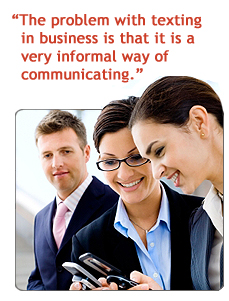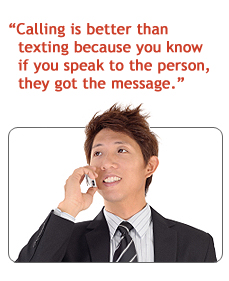 Of course you text. Who doesn’t? Consider these statistics: more than 70 percent of wireless users (that adds up to about 200 million Americans) have an SMS (or "short message service") package for their mobile device that allows them to text and about 2.5 billion – yes, billion – messages are sent daily in the U.S.
Clearly, sending information by typing a message on your cell phone and zipping it virtually instantaneously to friends and family has become almost second nature to a lot of us. Contacting colleagues and business contacts via texting has become commonplace, too.
Although texting is a fast, informal way to exchange information related to your work, it can also be unprofessional, inappropriate, and downright rude in certain situations.
Business etiquette and communications expert Barbara Pachter, author of Greet! Eat! Tweet! 52 Business Etiquette Postings to Avoid Pitfalls and Boost Your Career (CreateSpace), points out that while texting is here to stay, there are definite dos and don’ts when it comes to texting and your job.
 Texting under the table during a presentation or in a meeting? Don’t do it! "If you are sitting upfront, texting is noticeable and distracting to the speaker," Pachter tells Synergy. "In a huge meeting or if you are sitting on the back row in an assembly, you may think texting is unobtrusive. However you’re still telling the people around you that you are not paying attention."
Pachter, who shares her business etiquette knowledge through seminars, keynote speaking, executive coaching, an e-newsletter, books, and her website (http://www.pachter.com/), points out that even executives can make major blunders by texting without considering the consequences.
A case in point: the VP of a large company was in a final meeting with a potential client. The meeting went on for longer than expected and the VP began texting colleagues under the table.
"I learned from an insider with the company in question that they gave the contract to somebody else. The VP blew the deal by texting which indicated he wasn’t paying full attention to the matters at hand," Pachter relates.
Don’t assume it’s ok to text anyone and everyone in your company. The problem with using texting in business is that it is a very informal way of communicating. "If you are communicating with the CEO or VP with texting, they may not like it. You need to make sure it is the appropriate vehicle," notes Pachter. So how do you know it’s acceptable? If a manager or executive texts you first, then you can text them back.
Don’t text an apology. Even if you aren’t a football fan, you probably saw recent headlines about Vince Young, the Tennessee Titans quarterback, who texted an apology to his coach. Headlines such as "Titans coach not impressed with Young apologizing via text" and "Former Titans QB offers great apology… in the worst format possible" illustrate that texting is not always considered the appropriate way to communicate.
"It’s a way of apologizing without facing the music. If people are nervous or uncomfortable, it’s easier to do it that way," Pachter tells Synergy. "But it does not replace face to face communication. Apologize in person, when you can. If that’s not possible, the telephone is the next best alternative.
Give negative feedback in person, not via texting. Again, face-to-face interaction is always preferable. You may sound harsher than intended in a text, too. "Also, don’t quit your job in a text," Pachter says. "Talk to your boss. You don’t want to burn your bridges. After all, you may need a reference in the future."
 Don’t text to change the time of a meeting of a venue, if possible. "Calling is better than texting because you know if you speak to the person, they got the message. That’s the key," Pachter explains. "If you text, or email, the attendees may not have checked their messages in time. Of course, if you can’t reach people by phone, you can then try texting. But call first."
Be careful with abbreviations. It’s common to use short cuts when texting but stop and think – are you certain the receiver of the text will understand the meaning and is it appropriate to be that informal?
Pachter recalls an intern who worked with her who received a text from an executive that read simply "Y." The message was supposed to mean "yes," but the intern thought it was the question "why?" causing confusion.
Another note of caution: don’t email from your phone and use text shortcuts. "One young woman emailed a thank you note after a job interview from her phone and inadvertently used abbreviations such as ‘u’ and ‘thnx’," says Pachter. "That didn’t impress the potential employer and she didn’t get the job as a result.
Don’t drink and text. You are more likely to say something you will regret later. Bottom line: only text anything that has to do with business when you are thinking clearly, and considering the consequences.
|